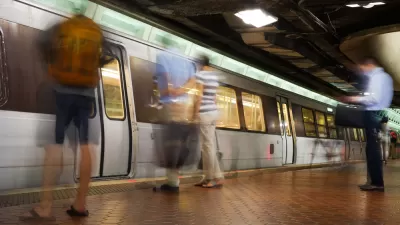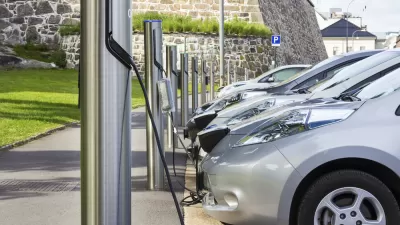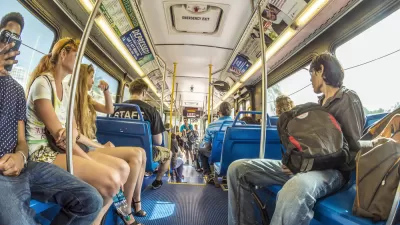The city's new transportation plan focuses on eliminating carbon emissions in its transportation sector, reducing congestion, and boosting public transit.

With its new Clean Transportation Electrification Blueprint, Seattle is embarking on an ambitious plan to electrify its transportation system and decrease congestion by boosting its EV charging network, encouraging more walking, biking, and transit ridership, and restricting private cars in parts of the city. But "these aspirations hinge on politically aligned values at all levels of government and cooperation with companies that have been hostile to regulations from the city," writes Michelle Baruchman in the Seattle Times.
Building on "Seattle's Green New Deal, which seeks to eliminate the city’s climate pollution by 2030, address environmental inequities and create thousands of green, unionized jobs," the plan requires "aggressive" efforts and collaboration across sectors. According to the plan, by 2030, "all ride-hailing trips would be electric and emissions free; almost one-third of deliveries would be made with vehicles that don’t emit carbon; a 'major area' of Seattle would be restricted to most cars; and charging stations would be reliable and readily available throughout the city."
The plan, which also includes congestion pricing for downtown Seattle, joins other efforts in Washington to reduce carbon emissions and improve public transit. "Washington State Ferries plans to convert its Wenatchee vessel from running solely on diesel fuel to using hybrid/electric power later this year," and "King County Metro has pledged to make its 1,500-bus fleet carbon free by 2040."
FULL STORY: ‘Major area’ of Seattle could forbid most cars under city’s new, greener transportation plan

Maui's Vacation Rental Debate Turns Ugly
Verbal attacks, misinformation campaigns and fistfights plague a high-stakes debate to convert thousands of vacation rentals into long-term housing.

Planetizen Federal Action Tracker
A weekly monitor of how Trump’s orders and actions are impacting planners and planning in America.

In Urban Planning, AI Prompting Could be the New Design Thinking
Creativity has long been key to great urban design. What if we see AI as our new creative partner?

King County Supportive Housing Program Offers Hope for Unhoused Residents
The county is taking a ‘Housing First’ approach that prioritizes getting people into housing, then offering wraparound supportive services.

Researchers Use AI to Get Clearer Picture of US Housing
Analysts are using artificial intelligence to supercharge their research by allowing them to comb through data faster. Though these AI tools can be error prone, they save time and housing researchers are optimistic about the future.

Making Shared Micromobility More Inclusive
Cities and shared mobility system operators can do more to include people with disabilities in planning and operations, per a new report.
Urban Design for Planners 1: Software Tools
This six-course series explores essential urban design concepts using open source software and equips planners with the tools they need to participate fully in the urban design process.
Planning for Universal Design
Learn the tools for implementing Universal Design in planning regulations.
planning NEXT
Appalachian Highlands Housing Partners
Mpact (founded as Rail~Volution)
City of Camden Redevelopment Agency
City of Astoria
City of Portland
City of Laramie





























